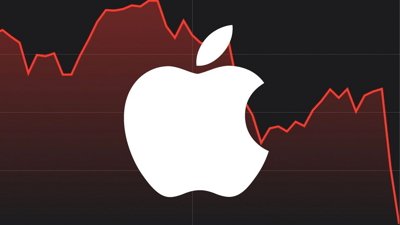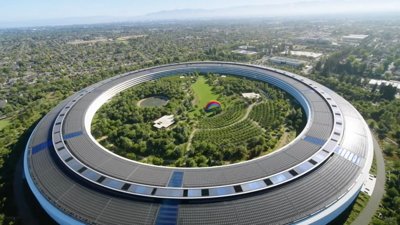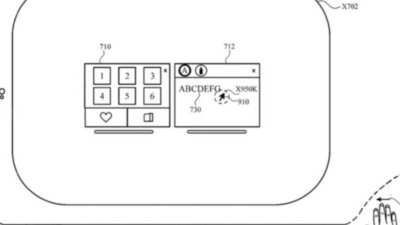First on AppleInsider — Five of the top companies in the online music industry are being sued by an individual who claims that the digital rights management software used by the Internet's most popular music download services violates a seven-year-old technology patent.
The patent describes a method for "Protection of Software Against Unauthorized Use" that Tse says was granted to him in 1998 by the United States Patent and Trademark Office because it was deemed to be a new, useful and unobvious idea.
Most music tracks downloaded from today's online music stores are encrypted with DRM technology that prevents them from being transfered and played on other user's computers and digital music players. The technology is essential for any music store which distributes licensed content because it helps reduce piracy through the Internet and other mediums.
The concept behind Tse's DRM patent has recently been adopted throughtout the online music industry. It relies heavily on a "psychological barrier" to discourage users from sharing music by embedding personal information into each music file the user purchases. In turn, privacy and tracking concerns would help dissuade users from allowing friends/family and others to copy the music tracks.
In the 17-page filing in Maryland District Court, Tse seeks a judgment enjoining the companies from further violation of his technology patent and asks that all software shown to infringe on his property rights be turned over. Tse also seeks legal fees, and both actual and statutory damages resulting from the infringement. He's demanding a trial by jury.
"The intent of the suit is not to control DRM" or "try and obtain untold riches," said Joseph Zito, a patent attorney for ZITO tlp, the Damascus, Md.-based law firm handling Tse's case. Instead, he says, "Mr. Tse and his company would like a reasonable royalty for what he's come up with and innovated."
Apple was the first company to be notified of Tse's patent when the inventor contacted the company approximately 11 months ago, according to Zito. Attorneys for both parties later met in an attempt to reach an out-of-court resolution but were unable to agree on amicable financial terms.
Although Zito declined to put a specific price tag on the case, in his conversation with AppleInsider he seemed content in letting each company use the concepts behind the DRM technology without any restrictions if they agreed to a "reasonable licensing fee." However, previous Internet reports suggest that Tse is asking for a whopping 12% share of the profits Apple has earned from its iTunes and iPod sales.
Nevertheless, industry sources believe the material impact of such a suit on the music companies will wind up being negligible.
"On a 99 cent download where 55 to 60 cents and in some cases 70 cents goes to the record labels, I would say maybe 5 to 10 cents could be related to DRM technology," said a Wall Street analyst who wished not to be named. "Having seen so many of these lawsuits all these years, I have a feeling this case could be dismissed or settled out of court and written off by the companies as a one-time item."
Of the five companies named in the lawsuit, Apple's iTunes Music Store leads the legal online music download market with an approximate 80% share, having sold over half a billion songs to date.
A hearing date for the case has yet to be scheduled and based on timetables for Maryland courts, the case is not expected to go before a jury until the summer of 2006.
 Kasper Jade
Kasper Jade
-m.jpg)






 William Gallagher and Mike Wuerthele
William Gallagher and Mike Wuerthele
 Andrew Orr
Andrew Orr
 Malcolm Owen
Malcolm Owen
 Amber Neely
Amber Neely

 Wesley Hilliard
Wesley Hilliard
 William Gallagher
William Gallagher










21 Comments
If Apple's attorneys met with this guy's attorney, then it must mean that they think his case is not totally baseless, otherwise, they'd tell him to shove it.
Now, if I am not mistaken, I believe Apple's DRM, FairPlay, isn't even their own creation -- they exclusively license it from another company. This could turn out just like the damned Eminem case! Remember, it was Apple's ad agency that ripped off "Lose Yourself", but Apple had to settle.
Between these problems and the Microsoft "iPod" patent, I'll bet the Intellectual Property department at Apple is probably getting reamed by Steve regularly. They are really f***ing up!
I wonder how much this guy thinks is a "reasonable" amount though. The record companies are already pushing for higher prices and a bigger cut of the profits from what little there is. If they met and couldn't come to an agreement maybe his asking price was astronomical or something.
Maybe Apple just offered him a free iPod or something.
LOL!
"The patent describes a method for "Protection of Software Against Unauthorized Use" that Tse says was granted to him in 1998 by the United States Patent and Trademark Office because it was deemed to be a new, useful and unobvious idea. "
Ahem. an unobvious idea? um wouldn't product activation and just about ANY program with an option for password protection to run be liable? Then shouldn't MS be liable Bigtime with there new security check b4 allowing access to software updates? Is it not preventing you from accessing the 'updater software' ? (assuming you are running a pirated version of windows.)
"The patent describes a method for "Protection of Software Against Unauthorized Use" that Tse says was granted to him in 1998 by the United States Patent and Trademark Office because it was deemed to be a new, useful and unobvious idea. "
Ahem. an unobvious idea? um wouldn't product activation and just about ANY program with an option for password protection to run be liable? Then shouldn't MS be liable Bigtime with there new security check b4 allowing access to software updates? Is it not preventing you from accessing the 'updater software' ? (assuming you are running a pirated version of windows.)
So then you are telling us that you also thought of this idea back in 1996 or so when he must have filed, or 1995 when he must have come up with it? Oh, right, the web had just gotten started about then, and most everyone was using 33.6Kbs modems. Real obvious.
Many ideas seem to be obvious once someone else comes up with it. Then people smack themselves on the forehead and say "Why didn't I come up with this, it's so obvious".
Most "obvious" concepts are not.
You also don't seem to have understood what was being said. It was the idea of putting the personal data within each song that made it original.
What I don't like is people or companies waiting until a business is very successful before pouncing.